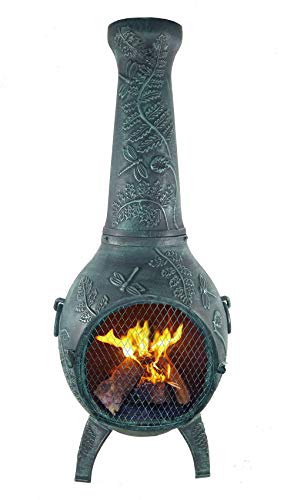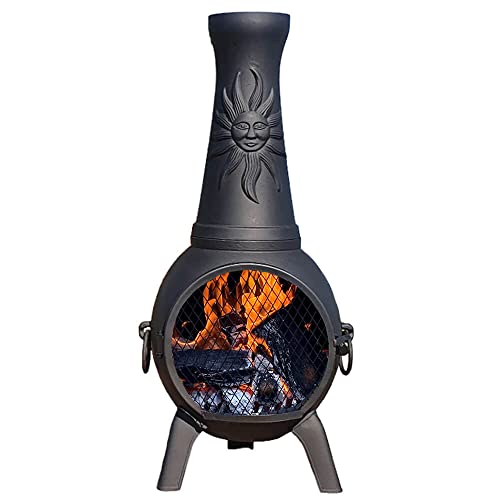Fire Pits & Chimineas Tools To Improve Your Daily Life Fire Pits & Chi…
페이지 정보
작성자 Ben Moreton 작성일 24-11-25 20:37 조회 3 댓글 0본문
 Chimineas Vs Fire Pits
Chimineas Vs Fire PitsSimilar to a stove with a pot-belly, chimineas have an opening in the front for stacking fuel, and a chimney that is attached to draw smoke upwards. They come in a variety of materials including clay and terra-cotta for an old-fashioned look, or iron and cast iron for greater durability.
Metal models are more robust and can withstand higher temperatures. Clay models require extra attention. Both add warmth and ambiance to outdoor spaces.
Chimineas
Chimineas resemble fireplaces in a number of ways, but they offer an attractive appearance and are designed specifically for outdoor use. They are usually constructed of clay or terra cotta and may be brightly decorated with Mexican-inspired themes. Modern chimineas tend to be constructed from materials like cast iron and aluminium, which are more resistant to damage and breaking than traditional clay.
Originally a stove with a potbelly The chiminea was first developed in Mexico and other Western states. Although they are mostly used for entertainment they are a stunning addition to any outdoor space and can serve as an attractive focal point to complement rustic decor. A chiminea's chimney's length can be used to direct smoke upwards, which helps to keep it from people who are seated around it, in contrast to fire pits, which usually feature an open flame that can cause sparks and embers to spread throughout the ground and adjacent areas.
Chimineas as well as fire pits can provide warmth to outdoor spaces, but they have different advantages and maintenance requirements. Personal taste plays an important role in this decision, as the intricate design of a chiminea can complement a range of different garden styles while a fire pit's minimalist, sleek design is suitable for a wide variety of outdoor spaces.
The difference in maintenance between fire pits and chimineas also has a lot to do with the materials of each, as clay and terra-cotta are more prone to damage than cast iron and aluminum. As a result, Chimineas usually require more frequent maintenance than fire pits.
Both types of outdoor fire features are popular to create a warm comfortable and welcoming space to get together with family and friends for dinners or cocktails. The closed and enclosed design of a chiminea makes it suitable for smaller groups and can be more efficient in warming up the area. Its more pronounced safety benefits result from the fact that it offers more protection from sparks and embers which could escape from the fire, and fire pits need to be carefully placed to minimise the risk of fire and must be constantly supervised.
Fire pits
It is possible to choose whether you want to add a chiminea or a fire pit when planning your outdoor area. Both bring warmth and class to your patio or garden, but they are different in terms of design operations, features, and security features. We'll help you find the most suitable option for your space, by comparing initial costs, maintenance, fuel costs, and more. We'll compare the heat output smoke, the safety and heat output of both.
A chiminea or chimenea (pronounced che-mehn-ee-yah) is an open-air fireplace that comes with an chimney and can be used to cook food. They can be constructed from clay, metals such as cast iron or steel, or cement or stone. They come in various shapes, styles, and sizes, offering the flexibility to suit various outdoor decors. They can be insulated to provide comfort and a contained flame. This reduces the risk of sparks and increases safety.
While chimineas can be used with charcoal or wood but it is best to make use of seasoned or kiln dried logs as moist wood releases more smoke and is less effective in heating. Chimineas require a bigger fire to keep warm, which can result in more smoke. This can be reduced by using log grates, which ensures proper airflow, and maintaining the chiminea.
Steel is the most well-known material for fire pits due to its affordability and durability. Some fire pits are portable, while others are permanent fixtures. They are usually built in the ground or on a raised deck and are available in various shapes, sizes and finishes that match an array of outdoor decors. Gas is an option since it offers convenience and control. Charcoal and wood can also be used.
Although they may be less troublesome to maintain than chimineas however, fire pits are considered to be more hazardous than chimineas. The open design of fire pits could cause more sparks to fly which could pose a risk for pets and children. They require careful placement away from objects that ignite and constant supervision to prevent accidental accidents. They can also produce an enormous amount of smoke and ash that could make it uncomfortable for some.
Safety
Both chimineas, and fire pits, can add warmth and awe to any outdoor space. However the use of them is not without risks. Both are extremely hot, which is why you should be cautious when using them, especially when you are around children and animals. Both are suitable for surfaces that are susceptible to cracking when heated (see below) which is why putting a layer of sand in your large chiminea, or a stone and brick slab under the fire pit is advisable. Both are able to release a considerable amount of smoke, which may be a problem if live in a windy location. The chiminea is a better option because of having the fire contained within it, which means it is less vulnerable to winds that blow ash and embers around. The opening is only on one side and you can't see the back, so it would be easy to leave a chiminea alone in a windy area.
It is essential to use only seasoned dried and kiln-dried logs in both types of fireplace since they burn more efficiently and produce less smoke. Avoid using flammable materials, such as paper, twigs and garbage, which can quickly ignite and cause an explosive reaction.
Be aware of any local burn bans that may be in effect. They can be caused by weather conditions that combine with high emissions to raise levels of fine particulate pollution to dangerous levels. These harmful toxins can cause respiratory issues when breathed in.
Keep a bucket or garden sprinkler handy in case your fire starts to get out-of-control. Also, ensure that the area around your fire pit is free of branches, twigs and leaves that are prone to catch fire. Finally, it is an ideal idea to have an emergency kit in the event of in case anyone is injured by smoke or sparks. With proper care, both a chiminea and a fire pit will last a long time. A cast iron chiminea is a more durable option for your patio than clay or terracotta which are less durable and may crack at high temperatures.
Maintenance
If you do not properly maintain your chiminea, or fire pit, in your backyard, it can cause serious dangers. If it is not properly used or placed too close to a home or other structures, it could cause an incident that could cause a house fire, and serious injuries or damages. It is also essential to ensure that only natural materials like wood can be burned, and that plastics, trash or liquid fuels are not used. Check your local weather forecasts to find guidelines regarding when you are allowed to burn. It is also recommended to keep a hose or fire extinguisher within reach in case of emergencies.
A chiminea is a traditional outdoor chiminea wood-burning fire, adds warmth and ambiance to the patios and gardens. Chimineas are available in a variety of designs and styles. They are made from clay metal, cast iron. Many chimineas have intricate traditional designs that provide a rustic feel to the outdoor space. Chimineas are also considered to be more sustainable than fire pits & chimineas pits since they produce less smoke and particle matter emissions.
To keep your chiminea in good condition, you should regularly clean it. Begin by removing any unburnt wood or ash from the inside of the grate. Then, create a small chiminea fire with a handful of pieces of firewood. Leave it to burn for around an hour then carefully dowse the flames with water to smother them completely. Then, allow the chiminea for sale near me to cool before creating another fire using larger pieces of wood.
Chimineas are beautiful addition to any outdoor space They require more care than fire pits. To avoid rust and other damages caused by the elements, they must be cleaned regularly. Additionally, chimineas can be very fragile and could break or crack if not handled carefully.
Ultimately, the choice of a fire pit or chiminea is based on personal preference and budget considerations. Both options offer advantages however, you should consider the initial cost as well as long-term costs before deciding which one is the best option for your home. If you are looking for a more permanent solution for your home, consider an individualized fireplace or chiminea constructed of tough materials like stone or steel that can withstand harsh weather conditions and more frequent use.

- 이전글 Private Psychiatrist Near Me Tips To Relax Your Daily Life Private Psychiatrist Near Me Trick Every Individual Should Learn
- 다음글 A Look Into The Future How Will The Private Psychiatrist Glasgow Industry Look Like In 10 Years?
댓글목록 0
등록된 댓글이 없습니다.
